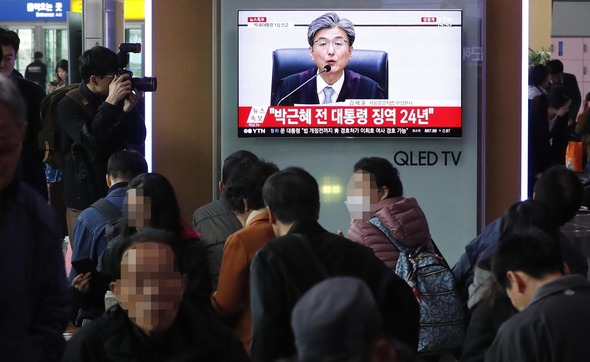 |
|
Citizens at Seoul Station watch former president Park Geun-hye’s sentence being pronounced in her first trial on corruption charges on Apr. 6. (by Park Jong-shik, staff photographer)
|
NIS special activity fund trial could result in a longer prison sentence for the former president
Former president Park Geun-hye’s first trial in connection with an influence-peddling scandal may have come to a close on Apr. 6, but initial court decisions are not finished for all charges against her. The first trial in another case concerning the payment of “special activity funds” by the National Intelligence Service (NIS) has only just begun. Depending on how fast it proceeds, the two cases could end up merged at the appeals court level, and with each being heard separately, the sentences in the event of convictions in both trials would be added together. On Jan. 22, Park was indicted on additional charges of bribery and misuse of state funds according to the Act on the Aggravated Punishment, etc. of Specific Crimes for allegedly conspiring with former NIS directors Nam Jae-joon, Lee Byung-kee, and Lee Byung-ho to receive 3.5 billion won (US$3.27 million) in NIS special activity funds. On Feb. 1, Park was also indicted on charges of ordering Hyun Ki-hwan, former Blue House Senior Secretary for Political Affairs, to arrange for her allies to be nominated for the Saenuri Party (the forerun to the current Liberty Korea Party) in the 2016 parliamentary elections. That would constitute a violation of the Public Official Election Act. Both of these cases are being tried by the 32nd criminal division of the Seoul Central District Court under Hon. Seong Chang-ho. The fourth and fifth preliminary hearings were held last month, and the actual trial is set to begin sometime this month. The 32nd criminal division is also hearing the trials of Nam Jae-jun, Lee Byung-kee and Lee Byung-ho, who have been indicted on charges of giving bribes to Park. Considering that the maximum period of time that Nam Jae-jun and Lee Byung-kee can be detained during the first trial is six months, their verdicts are likely to be issued before June 4. Since Park was not detained in connection with this case, she is under no particular restrictions for the duration of the trial. Just as with her influence-peddling case, Park is refusing to participate in the trial about the special activity funds and has chosen not to appoint a lawyer. Nevertheless, state-appointed attorneys pleaded not guilty during the fourth preliminary hearing on Mar. 16 based on a handwritten statement by Park. “After being inaugurated as president, Park was briefed that there was a practice of using funds received from the NIS, so she gave instructions to accept and use those funds as long as they did not present a legal problem. She never asked the NIS director for special activity funds, and she was never briefed about the specific amount or use of those funds,” Park’s attorneys said. Park’s attorneys also denied the charges about violating the Public Official Election Act: “Park never gave instructions to plan an election campaign, nor did she receive a briefing or give approval for such a campaign.” Bribes are at the heart of both the influence-peddling and the special activity fund cases, and if the court concludes that Park received bribes worth more than 100 million won (US$940,000), she could be sentenced to between 10 years and life in prison. If the two cases are merged on appeal, Park’s sentence would range from a minimum of 10 years to a maximum of 45 years, but if the two cases are decided separately, the two sentences would simply be added together. In such an event, the court might take Park’s previous sentence into consideration when it decides its own sentence. By Kim Min-kyung, staff reporter Please direct questions or comments to [english@hani.co.kr]






